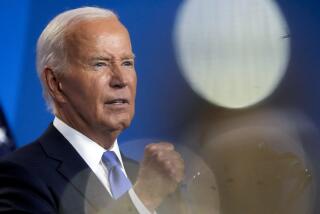A Good, Hard Preseason
- Share via
At their best, the presidential primaries resemble baseball’s spring training. Fans get to come out and see the stars up close. A rookie phenom pops up, while a seasoned veteran makes a startling comeback. Everyone huffs and puffs to get in shape. In theory, at least, the best performers are left standing. Then it’s off to the pennant race.
Something like this is happening with the Democratic primaries. Though Massachusetts Sen. John F. Kerry looked as if he was on life support before the Iowa caucuses, he showed spring in his legs as he outflanked the cocky rookie Howard Dean. The Rev. Al Sharpton’s poor performance in South Carolina showed again that black voters can’t be taken for granted. Sen. Joe Lieberman, a star in 2000 beside Al Gore, faded and left the field.
Given Kerry’s overwhelming lead in polls in delegate-rich Michigan -- which votes Saturday along with Washington state, where Kerry is favored by pundits -- the vigor of the contest could dim by Sunday. However, the longer the struggle, the better the party’s ticket is likely to be. Democrats haven’t had a good knockdown primary since 1992, when Bill Clinton, an unknown but a consummate campaigner, came from behind to lock up the race with a win in New York on April 7.
The 2004 contest unfortunately may effectively be over before the March 2 Super Tuesday votes, including primaries in California and New York, but it has toughened the candidates and shown that voters are studying their messages. Democrats appear to be pragmatically searching for the most electable candidate.
If Kerry wins the nomination, he should give a grateful bow to Dean. Had Dean not trained his fire on the Bush administration and confronted the other candidates on their voting records on the Iraq war and other issues, Kerry and others wouldn’t have felt the same urgency to improve their messages. Kerry, like Sen. John Edwards (D-N.C.), has dramatically improved his ability to connect in speeches and among crowds.
So far, no candidate has offered a comprehensive, specific platform, particularly on hot-button issues such as immigration. The Democratic rivals denounced George W. Bush regarding his reasons for going to war in Iraq and called his tax cuts unfair and damaging. But it will take a strong, positive message, not just blanket denunciations to make it a real race in the fall. How would a President Kerry, Edwards, Dean or Wesley Clark deal with creating a stable Iraq and pulling out American troops? How would each phase back tax cuts -- something the remaining top candidates favor -- without pushing new domestic spending that would keep deficits burgeoning?
No candidate wants to tip Bush to his precise message before the national conventions, but with new polls showing him vulnerable, the president is already on alert.
The primaries are invigorating for the republic. And, as any fan knows, a close pennant race is better preparation for the World Series than a blowout that lets the winner get fat and lazy.
More to Read
Get the L.A. Times Politics newsletter
Deeply reported insights into legislation, politics and policy from Sacramento, Washington and beyond. In your inbox twice per week.
You may occasionally receive promotional content from the Los Angeles Times.










